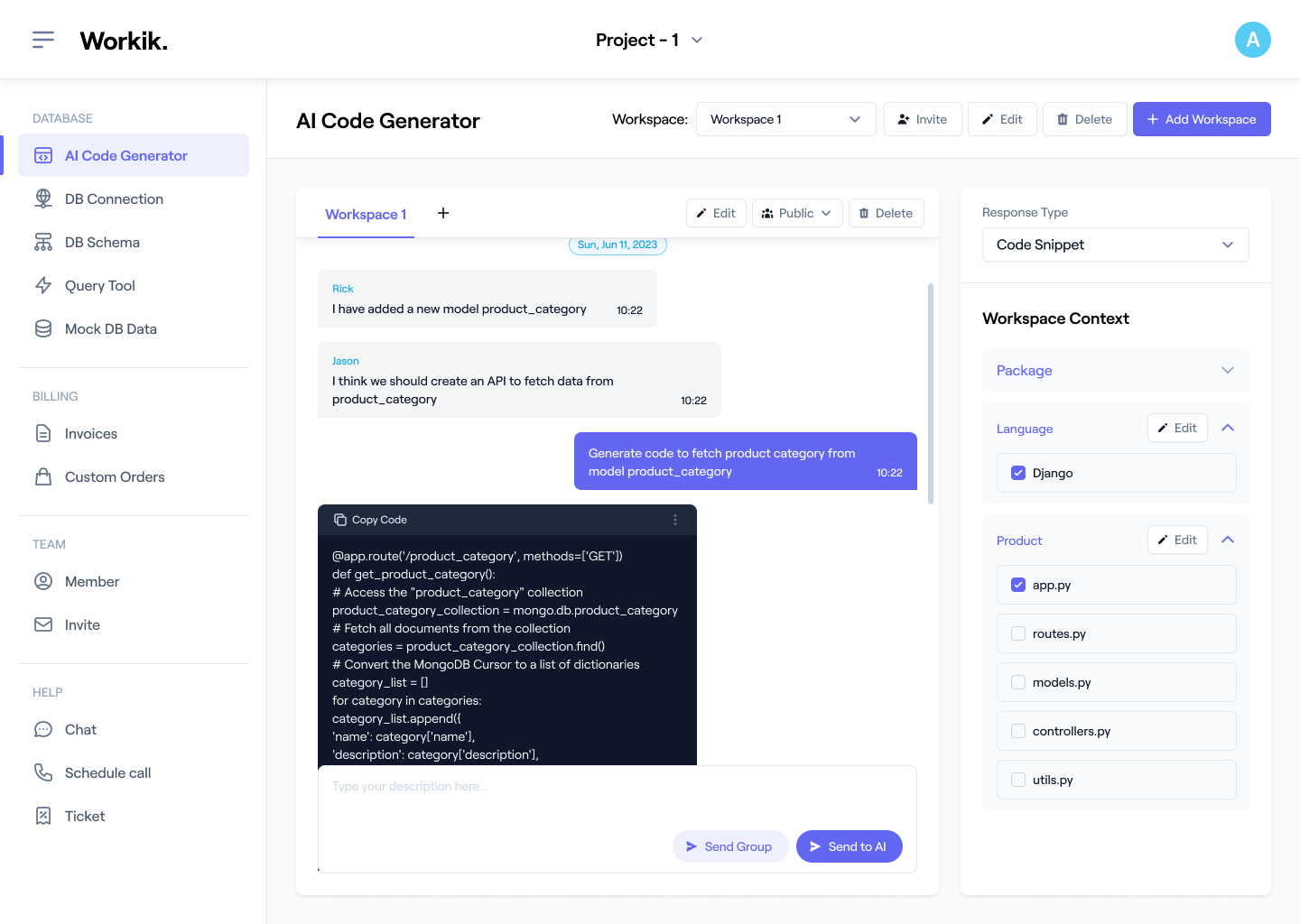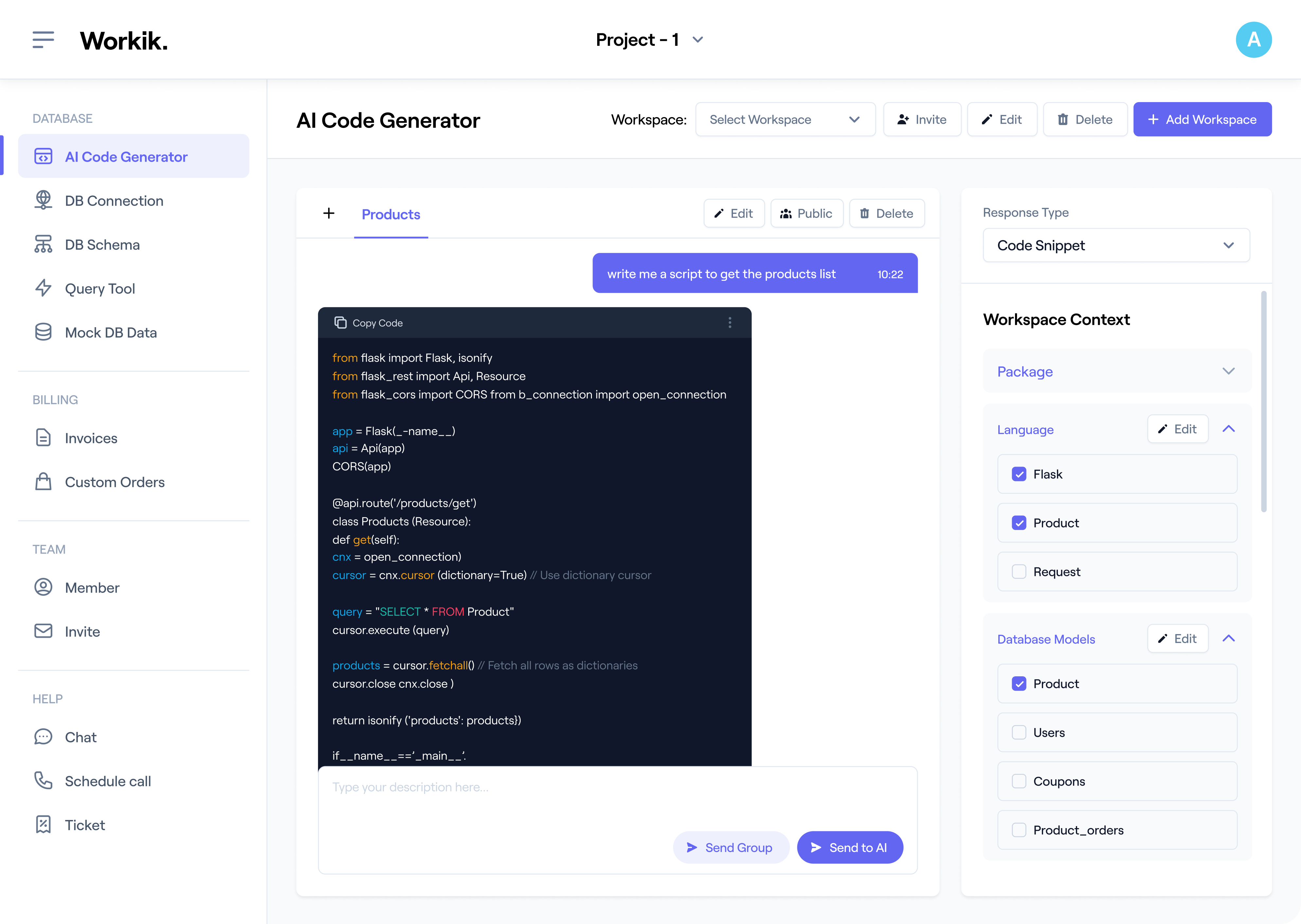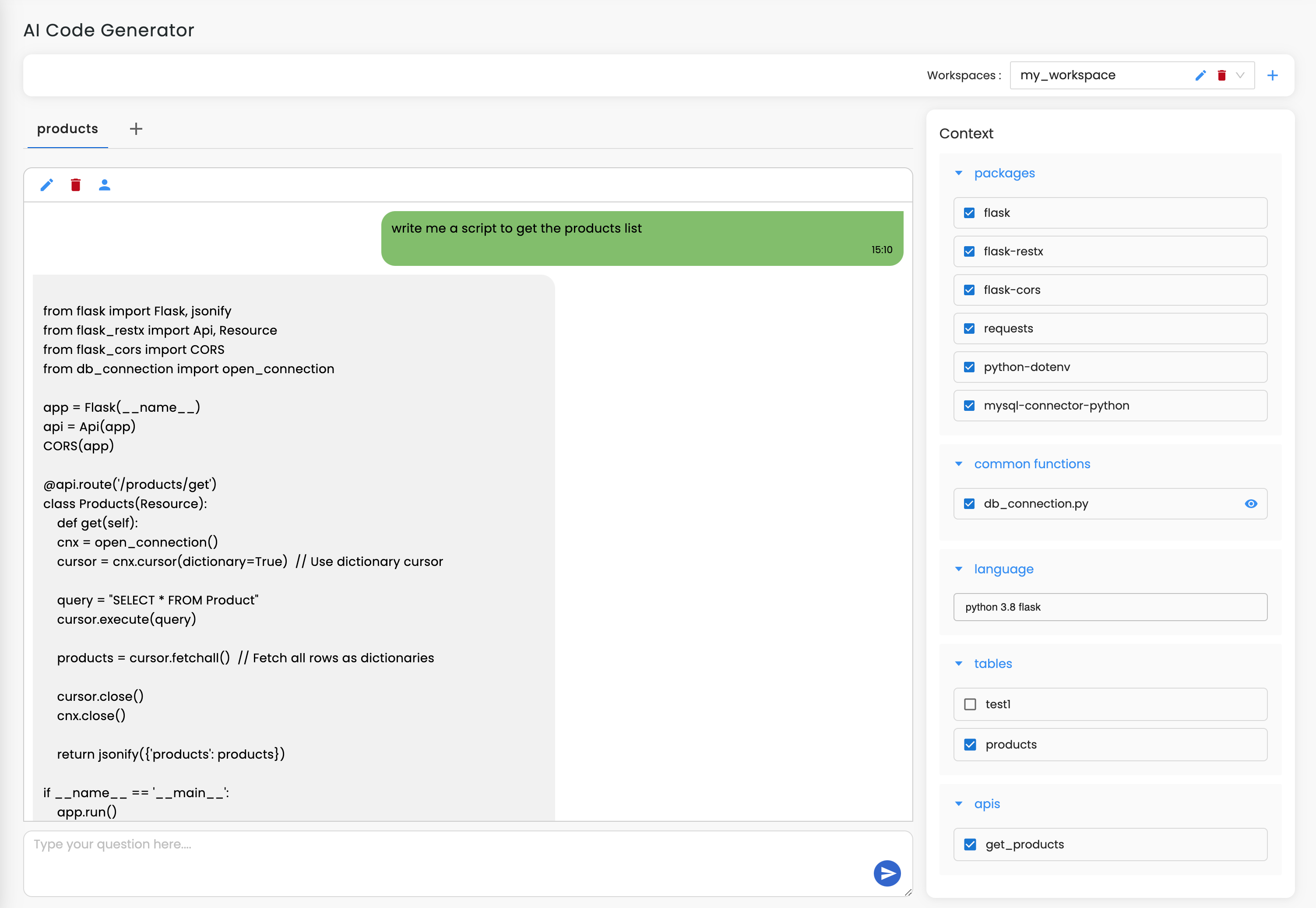Join our community to see how developers are using Workik AI everyday.
Supported AI models on Workik
GPT 5.2 Codex, GPT 5.2, GPT 5.1 Codex, GPT 5.1, GPT 5 Mini, GPT 5
Gemini 3.1 Pro, Gemini 3 Flash, Gemini 3 Pro, Gemini 2.5 Pro
Claude 4.6 sonnet, Claude 4.5 Sonnet, Claude 4.5 Haiku, Claude 4 Sonnet
Deepseek Reasoner, Deepseek Chat, Deepseek R1(High)
Grok 4.1 Fast, Grok 4, Grok Code Fast 1
Models availability might vary based on your plan on Workik
Features

Generate Unit Tests Instantly
AI quickly analyzes Java methods to build JUnit test cases that cover logic branches, exceptions, edge cases & more.

Mock Services Cleanly
Use AI to effortlessly create Mockito and @MockBean-based tests that isolate APIs, services, and dependencies.

Validate Database Logic Precisely
Leverage AI to accurately generate integration tests with H2 or Testcontainers, aligning with schema constraints and data flows.

Structure CI-Ready Tests Seamlessly
Apply best practices for naming, setup, and teardown using AI. Integrate tests smoothly with Jenkins, GitHub Actions, and GitLab.
How it works
Create your free Workik account in seconds to unlock access to the AI-powered JUnit test case generator for Java projects.
Import Java code files or sync your project from GitHub, GitLab, or Bitbucket. Add service classes, controllers, or utility methods to guide AI-driven test generation.
AI generates complete JUnit files, detects edge cases, configures parameterized tests, refactors redundant logic, and suggests clean assertions and naming based on Java testing standards.
Invite your team to review and edit test cases in Workik. Export AI-generated JUnit tests directly into your Maven or Gradle project, ready for execution in your CI pipeline.


Expand
.png)
.png)
Expand


Expand


Expand


Expand


Expand


Expand


TESTIMONIALS
Real Stories, Real Results with Workik
Workik AI made it ridiculously fast to generate JUnit tests for dozens of service classes. Zero setup, just results.

Sofia Klein
Senior Java Developer
Our team uses Workik to keep JUnit tests aligned with business logic. Even our legacy code has coverage now.

Marcus Lee
Software Architect
Mocking external APIs with JUnit used to slow us down. Workik handles it in seconds with clean Mockito setups.

Carmen Ortega
Full Stack Engineer
What are the popular use cases of Workik's AI for JUnit test case generation?


* Generating structured unit tests for service, utility, and controller classes using JUnit 4 or 5.
* Automating dependency mocking with Mockito or @MockBean for clean isolation.
* Creating parameterized test cases to handle multiple inputs and edge scenarios.
* Writing integration tests for repositories using in-memory databases like H2 or Testcontainers.
* Refactoring inconsistent or legacy tests to align with JUnit conventions and modern practices.
What kind of context can I add in Workik AI related to JUnit test case generation?


Setting context in Workik is optional but enhances AI-generated JUnit test cases. Here are the types of context you can add:
* Link repositories from GitHub, GitLab, or Bitbucket to sync your Java project files.
* Add frameworks like Spring Boot or Jakarta EE for framework-aware test generation.
* Import service classes, utility methods, or controllers for targeted test creation.
* Provide API endpoints or controller mappings for integration testing with Spring MVC.
* Upload project configuration files like pom.xml or build.gradle to align with dependencies.
* Include test libraries like JUnit, Mockito, Hamcrest, or AssertJ to guide test logic.
* Add entity classes, DTOs, or database schema references for data-layer validation.
Can Workik generate JUnit tests for abstract classes or interface-driven architecture?


Yes. Workik analyzes concrete subclasses to scaffold tests for abstract classes. For interfaces, it infers behaviors from implementing classes and uses mocks where needed, ideal for domain-driven and Spring-based architectures.
What if my project mixes JUnit with TestNG or custom runners?


Workik adapts to hybrid setups. It detects TestNG, SpringRunner, or custom runners and aligns test generation accordingly. You can modularize output for smooth integration across legacy and modern frameworks.
How does Workik handle overloaded methods or variants?


AI generates distinct test cases for each method signature. It evaluates parameters and logic per overload, ensuring clear separation and full coverage without duplication.
How does Workik handle complex dependency chains or circular references in tests?


The AI detects circular service references and deep dependency chains, then intelligently mocks or breaks them for clean unit isolation. This is particularly useful in legacy enterprise systems where circular calls or nested dependencies are common and hard to mock manually.
Can Workik enforce testing standards across my team?


Yes. You can define test naming, structure, assertion libraries, and annotations. Workik applies these rules across all generated JUnit tests to maintain consistency across teams.
Can’t find the answer you are looking for?
Request question

Generate Code For Free

JUNIT: Question & Answer
JUnit is a leading Java testing framework used for writing unit and integration tests. It supports annotations like @Test, @BeforeEach, and @AfterAll for defining structured test cases. JUnit 5 introduces modular architecture and better support for Java 8+, making it ideal for TDD and CI workflows in modern Java applications.
Popular frameworks and libraries often used with JUnit include:
Mocking and Stubbing:
Mockito, EasyMock
Assertions and Matchers:
Hamcrest, AssertJ
Spring Testing Support:
Spring Boot Test, SpringRunner, @SpringBootTest
Database Testing:
Testcontainers, H2, DBUnit
Parameterization:
JUnitParams, @ParameterizedTest
Code Coverage:
JaCoCo
CI/CD Integration:
Jenkins, GitHub Actions, GitLab CI
Popular use cases for JUnit include but are not limited to:
Unit Testing:
Testing individual Java methods, services, and utility classes.
Integration Testing:
Validating Spring Boot services, controllers, and database interactions.
Mock-Based Testing:
Isolating dependencies using Mockito or @MockBean in Spring applications.
Parameterized Testing:
Running the same test with multiple inputs using JUnit 5's @ParameterizedTest.
Legacy System Coverage:
Adding test coverage to untested legacy code using minimal refactoring.
CI/CD Testing:
Running JUnit tests automatically as part of build pipelines with tools like Maven and Jenkins.
REST API Testing:
Validating controller logic, request mappings, and HTTP response codes in Spring MVC applications.
JUnit skills are essential for roles like Java Developer, SDET, QA Engineer, Automation Engineer, and Backend Developer. It's a must-have for teams using CI/CD, Spring Boot, and TDD in enterprise Java environments.
Workik AI enhances JUnit testing workflows by:
Test Case Generation:
Auto-generating JUnit 4 or 5 tests for services, controllers, and utilities.
Edge Case Coverage:
Identifying branches, null checks, and exceptions to boost test depth.
Mocking Support:
Creating isolated tests using Mockito or @MockBean.
Legacy Code Testing:
Detecting testable logic in older codebases without refactoring.
Spring Context Configuration:
Generating context-aware tests with @SpringBootTest or @WebMvcTest.
Database Integration:
Writing repository tests using H2, Testcontainers, or mock data layers.
Test Optimization:
Refactoring tests for structure, reducing redundancy, and improving assertions with AssertJ or Hamcrest.
Documentation & Reporting:
Generating readable test docs and summaries for easier maintenance and team onboarding.
Explore more on Workik
Top Blogs on Workik
Get in touch
Don't miss any updates of our product.
© Workik Inc. 2026 All rights reserved.

